| Reviews & Columns |
|
Reviews DVD TV on DVD Blu-ray 4K UHD International DVDs In Theaters Reviews by Studio Video Games Features Collector Series DVDs Easter Egg Database Interviews DVD Talk Radio Feature Articles Columns Anime Talk DVD Savant Horror DVDs The M.O.D. Squad Art House HD Talk Silent DVD
|
DVD Talk Forum |
|
|
| Resources |
|
DVD Price Search Customer Service #'s RCE Info Links |
|
Columns
|
|
|
George Eliot Collection, The
If you're like me, you'll pretty much watch any British TV adaptation of a historical novel. Growing up on PBS's Masterpiece Theater in the 1970s, long-form British TV was a relatively exotic commodity for this Midwestern boy, and it proved to be a great introduction to appreciating British Victorian novels - the staple of such imported programs. I vividly remember studying Middlemarch in college, and I'm pretty sure I read Adam Bede and Silas Marner at some point, so I was quite looking forward to watching BBC Video's The George Eliot Collection, featuring 1978's The Mill on the Floss, 1985's Silas Marner: The Weaver of Raveloe, 1992's Adam Bede, 1994's Middlemarch, and 2002's Daniel Deronda. While these long-form adaptations vary in approach and effectiveness, all of them are worthwhile additions to your collection of British television.
Studying George Eliot back in college, I remember being just as fascinated with her personal life, as I was with her literature (which would certainly go along with Victorian audiences who were equally intrigued with her unusual lifestyle). Watching these film adaptations brought back all the discussions we had in class about her singular innovations to the Victorian novel, including deep psychological portraits of her characters (instead of recognizable stereotypes), social commentary (each one of these films has a central theme of class status and the resulting problems from lack - or excess - of money), and her adherence to realistically depicting rural life, and all of its complexities (instead of the usual idyllic, romanticized versions of English countrysides). Let's look at the individual films.
THE MILL ON THE FLOSS
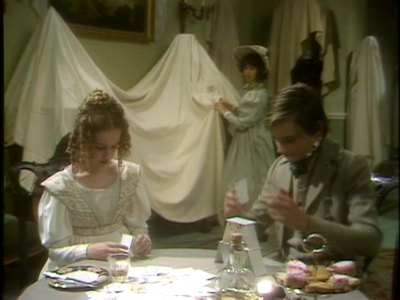
Set in the 1820s in rural England, The Mill on the Floss tells the story of Maggie and Tom Tulliver, the children of Mr. Tulliver (Ray Smith), the owner of a local mill. Maggie (Georgia Slowe, then Pippa Guard) is a idealistic, willful, headstrong girl whose actions are always considered out of the norm. Her intellectual curiosity is matched by her brother Tom's (Jonathan Scott-Taylor, then Christopher Blake) contempt for her sensitivity. The Tulliver household is under increasing pressure due to Mr. Tulliver's fondness for bringing lawsuits against his neighbors, and the vagaries of his business. Eventually, Mr. Tulliver loses the mill to bankruptcy, and falls ill from a stroke.
Meanwhile, Maggie has renewed her friendship with Philip Wakem (Anton Lessor), a hunchbacked intellectual who is the son of the lawyer who proved to be Mr. Tulliver's nemesis (Maggie and Philip went to school together as children). This friendship, based on a love of ideas as much (or more so) as a physical attraction, enrages young Tom, who has gone into business to pay off his father's debts. Despite their love for each other, Maggie is forced by her family to renounce their relationship. Maggie, restricted by her position in society (an unmarried woman), is unable to realize her full artistic and intellectual potential in the backwaters of Floss.
When her father dies, Maggie goes to live with her cousin, Lucy Deane (Mona Durbridge), who is engaged to handsome, lively Stephen Guest (John Moulder-Browne). Naturally, both Stephen and Maggie become attracted to each other, even going so far as to deciding on an impromptu elopement. But events conspire to keep them apart, and a natural disaster back at the old mill on the Floss results in a deadly climax.
Produced in 1978, and running over three and a half hours, The Mill on the Floss suffers from some questionable casting, as well as the irritating standard video/film mix of so many British TV productions from that time. It's difficult to get a sense of Eliot's deeply compassionate take on young Maggie when the child actress chosen to play the part is so...strange. It's a most unpleasant performance emphasizing all the negative qualities of Maggie, while eliciting no sympathy from the viewer (Taylor-Scott, from Damien: Omen II, is excellent, though). As well, there's a certain variance of tone to the dramatics, particularly during the first few episodes, that undermines the tragic nature of the final denouement. The early scenes almost have a Benny Hill-ish quality to their staging that suggests Richardson's Tom Jones rather than George Eliot.
As well, the switch from exterior 16mm film, to video for all interior shots, is most annoying, as I've written about before. Reflective of the limited budgets of these British productions, it's a visual pattern that takes constant adjusting to, and which modern audiences might very well reject. Not helping matters is the relatively poor quality of the washed out video master used for this DVD transfer. Still, despite these technical problems (which some viewers may actually find nostalgic), The Mill on the Floss does present an overall decent cinematic version of the Eliot classic, with its main bonus being its elongated running time. Details are dwelled on, and quite a bit of Eliot's plot is allowed to stay in.
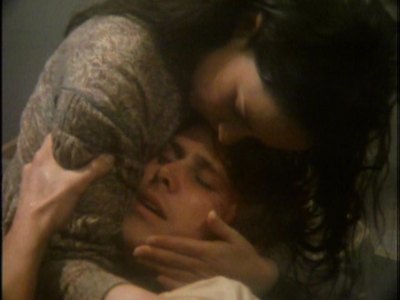
The DVD:
The Video:
The full frame video image for The Mill on the Floss is quite poor, with a soft, at times blurry, video image that looks exactly like an old VHS copy I saw back in the early 80s. I would imagine it looked better on television when it was originally broadcast.
The Audio:
The English mono soundtrack accurately reflects the original broadcast presentation. Close captioning is available.
The Extras:
There are no extras for The Mill on the Floss.
Final Thoughts:
A tentative production marred by the miscasting of a central character still doesn't negate the strengths of this epic production, chief among those virtues the film's attention to detail and adherence to Eliot's story. The Mill on the Floss is rough looking, due to the original source materials, but it's still recommended.
SILAS MARNER: THE WEAVER OF RAVELOE
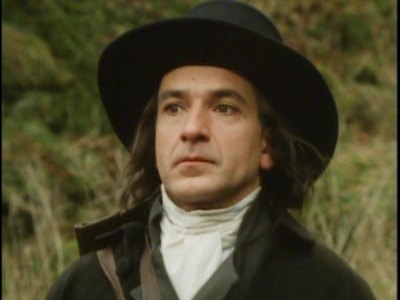
Set in rural England during the early 1800s, Silas Marner: The Weaver of Raveloe recounts the life of Silas Marner (Ben Kingsley), a weaver who is exiled from his church when he is falsely accused of stealing money from his church's dying deacon. Silas was indeed in the room when the money was stolen by his best friend, but one of his frequent "trances" made him oblivious to the theft. Losing his fiancé and his home, Silas moves to a small, isolated cottage outside Raveloe, where he works year after year as a weaver, living as a recluse and causing no end of gossip about his strange ways.
Silas, now a miser who hordes his gold in the stone floor of his cabin, is robbed one night by Dunstan Cass (Jonathan Coy), the gambling reprobate son of Squire Cass (Freddie Jones). Silas's fifteen years of work are gone in an instant, and despite the efforts of the townsmen to find the culprit, the money is gone when Dunstan disappears. Godfrey Cass (Patrick Ryecart), the good son of Squire Cass, suspects that it was his brother, but has no proof. He has worries of his own. His secret wife has become an alcoholic and opium user, endangering the life of his baby. On a fateful New Year's Eve night, when Godfrey's wife was coming to Raveloe to tell his family of their marriage, she dies in the snow, with her little girl wandering into Silas's cottage. Silas gathers up the baby and runs to the Squire's party, telling everyone of the woman's death - and declaring that he shall keep the baby to raise as his own. Godfrey, not wishing to lose the love of Nancy Lammeter (Jenny Agutter), keeps silent about the baby and agrees to help Silas with money for the child.
Over the years, Silas proves to be a doting, loving father to little Eppie (Elizabeth Hoyle, then Melinda Whiting, then Patsy Kensit), finding in her love the redemption from his previous crushing loneliness. However, when Godfrey and Nancy lose their own child at birth, they decide that they should claim Eppie as their own. It's now up to Eppie what kind of life she shall lead.
Produced in 1985, and running a speedy, swift ninety minutes, Silas Marner: The Weaver of Raveloe is one of the best adaptations in The George Eliot Collection. Benefitting from a subtle, knowing performance by Ben Kingsley, Silas Marner: The Weaver of Raveloe wastes no time in telling its story. Rapidly moving through the opening storyline of Silas in his religious community, the film adaptation clearly wants to concentrate on his interaction with Eppie, and those scenes are the real heart of this splendid production. Kingsley, who's not afraid to look like some horrible little gnome as he trudges through the countryside peddling his wares, positively glows when he's acting with Elizabeth Hoyle as baby Eppie. She's an adorable little actress, and it's not hard to see that Kingsley delights in his scenes with her. Agutter doesn't have much to do here, and Ryecart proves to be a little too strident right off the bat, but Freddie Jones - always a favorite of mine - is excellent as always as the put-upon Squire.
Filmed in the Cotswolds, Silas Marner: The Weaver of Raveloe probably looked amazing when it first came out, but the video master used for this DVD transfer is quite harsh, with muddied, dark colors and a soft picture. The direction by Giles Foster is straightforward and unembellished, emphasizing character over compositions, and the screenplay by Foster and Louis Marks is a marvel of compression. Compact yet emotionally resonant, Silas Marner: The Weaver of Raveloe is a satisfying cinematic adaptation of the Eliot novel.
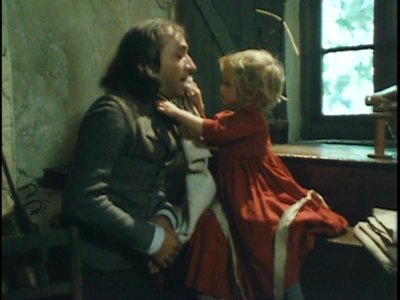
The DVD:
The Video:
Shot entirely on film, Silas Marner: The Weaver of Raveloe at least doesn't suffer from the film/video mix of The Mill on the Floss, but the picture image still leaves a lot to be desired. Colors are muddy; and there's a lot of video noise in the picture (no doubt due to the original source materials). It's not a sharp image, either, unfortunately.
The Audio:
The English mono soundtrack accurately reflects the original broadcast presentation. Close-captioning is available.
The Extras:
As a bonus, George Eliot: A Scandalous Life, a 58 minute BBC featurette from 2002 using actors recreating Eliot's life, along with clips from other TV adaptations of her work, is included. It's a tad overwrought at times, but useful for getting a background on the famous author.
Final Thoughts:
Short, clean, and remarkably compressed, Silas Marner: The Weaver of Raveloe is a real gem, with a standout performance by Ben Kingsley. Silas Marner: The Weaver of Raveloe is highly recommended.
ADAM BEDE
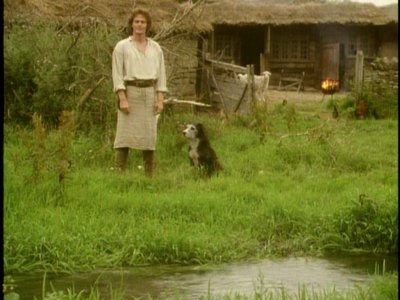
Set in the rural community of Hayslope at the very beginning of the 19th century, Adam Bede tells the story of Hetty Sorrel (Patsy Kensit), a beautiful dairymaid who finds admirers throughout the county. Chief among them is Adam Bede (Iain Glen), a kindly carpenter who loves Hetty. But Hetty doesn't love Adam; instead, she finds love and sex with Captain Arthur Donnithorne (James Wilby), the heir to the county's big estate who's convalescing from an injury. Adam is attracted to Dinah Morris (Susannah Harker) as well, a cousin to Hetty and a fervent Methodist preacher (which doesn't go over well in Hayslope).
When Adam finds out that Arthur has been seeing Hetty, he fights with him, and convinces Arthur to break it off with Hetty. Arthur does, and leaves for his regiment. Adam convinces himself that he will marry Hetty, but before the wedding, she leaves town - carrying Arthur's child inside her. Chasing after Arthur, she misses him (he stationed in Ireland), and gives birth to her baby. But, in her "confusion," she buries the living child in a field, killing it, and stands trial for murder. Will Adam get Arthur to save Hetty's life?
Watching the film Adam Bede, I was reminded at how confused I felt when I read the novel. Throughout the film, which was produced in 1992 and which runs a quick 102 minutes, I was often struck by how behaviors initiated by the characters have no grounding in the plot. For instance, when Adam confronts Arthur about Hetty, he acts as if Hetty has been promised to him (his "happiness"), but nowhere in the film is that relationship spelled out. As well, Adam is often shown with Dinah, and unexplained glances are exchanged between the two, but nowhere are we sure what's going on between them, until the final phony ending (which critics of the book hated, too). Indeed, I remember being unswayed by George Eliot's efforts to make me sympathize with Hetty's horrendous actions when I read the book; in the film, her act of murder is described in detail, with the result being revulsion, not empathy, from the viewer.
I'm not sure the performances in Adam Bede are what they could be, either. Glen has several scenes that frankly are embarrassing, with one where he breaks down crying that inspires laughs, not sympathy. Kensit is certainly beautiful enough to play Hetty, but the character is so vaguely drawn in the film (in the novel, she's supposed to be materialistic and flighty, but in the film, little if any motivation is drawn from her actions) that we're distinctly uninterested in her plight. Harker is another beauty as Dinah, but her character, as written and directed in this film, is so one-dimensional that we lose interest in her quickly, too. Only old pro Robert Stephens (The Prime of Miss Jean Brodie, The Private Life of Sherlock Holmes) has any fun with his sly line readings. He's a wonder here, but unfortunately, he's reduced to just a few scenes. Other big English character actors like Jean Marsh, Freddie Jones, and George Innes, are wasted in throwaway roles. An underdeveloped script from a questionable original source novel, along with some ill-chosen performances, makes Adam Bede the least successful of the TV adaptations in The George Eliot Collections.
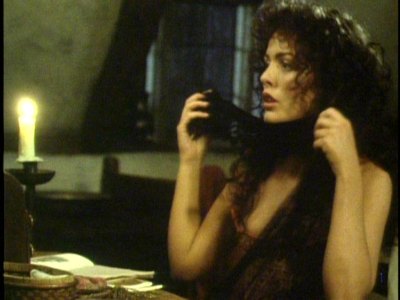
The DVD:
The Video:
Looking about on par with Silas Marner, Adam Bede has a lot of video picture noise, along with muddy colors, and a soft, fuzzy picture (no doubt coming from the original source materials).
The Audio:
The English 2.0 stereo presentation is clear, and close-captioning is available.
The Extras:
There are no extras for Adam Bede.
Final Thoughts:
The least successful of the film adaptations in The George Eliot Collection, Adam Bede suffers from an underdeveloped script, some iffy acting choices, and an unconvincing main story -- courtesy of Eliot's less-than-successful novel. Completists will watch Adam Bede since it's included in this box set, but on its own, I would suggest a rental first.
MIDDLEMARCH
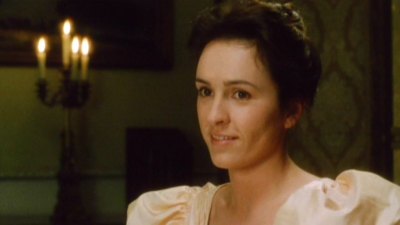
Telling the twin stories of idealists Dorothea Brooke (Juliet Aubrey) and Dr. Tertius Lydgate (Douglas Hodge) - this will be the briefest of summaries, considering the complexity and length of the story - Middlemarch chronicles the downfall of their ambitions and dreams as the realities of the coming Industrial Revolution play in the background of this romantic epic. Dorothea, who lives with her uncle Arthur Brooke (Robert Hardy) and her sister Celia (Caroline Harker), is an ambitious, intellectual beauty who wishes for a more spiritual and mentally challenging life for herself than the one offered by potential suitor and stereotypical English gentleman Sir James Chettam (Julian Wadham). Instead, she finds love with the funereal Reverend Edward Casaubon, a dry stick of a man who is working on a never-ending catalogue of the world's religions and belief systems.
Dr. Lydgate has come to Middlemarch to run a new hospital devoted to fever cases. He naively thinks he will run things his way, owing to the fact that Middlemarch is set down in the sticks, and therefore void of the petty squabbles and political backstabbing of London. He's quickly disavowed of those notions when he's caught in the middle of a battle between evil banker Bulstrode (Peter Jeffrey) and Reverend Farebrother (Simon Chandler), a well-liked minister who also gambles to make ends meet. Lydgate finds further trouble in the vexing affections of Rosamond Vincy (Trevyn McDowell), a careless, charming spender who wants to marry Lydgate despite his intention of devoting his life to his medical studies. Her brother Fred Vincy (Jonathan Firth), a luckless gambler, is embroiled in scandal when it's found out that he's been borrowing money on the prospect of inheriting money from his wealthy relative, Peter Featherstone (Michael Hordern).
As Dorothea discovers that her marriage to Casaubon is a disaster, she finds herself drawn to Will Ladislaw (Rufus Sewell), a relative of Casaubon's who is finding his way through life as an artist. When Causabon dies, she inherits his estate, but there's a codicil to the will that demands she never marry Will or suffer disinheritance. Lydgate, suffering financial straits due to his and his wife's profligate spending habits, wishes Bulstrode to lend him money, but only when Bulstrode becomes involved with shady character Raffles (John Savident) does he lend Lydgate money - with disasterous results for both of them when Raffles dies. To what end will Dorothea and Dr. Lydgate end their days in Middlemarch?
I saw Middlemarch when it played on PBS back in 1994. Running seven hours, it's a remarkably detailed adaptation of the Eliot novel, with an admirable focus on getting Eliot's commentaries on how social mores affect romantic entanglements, across to the viewer. Sporting the biggest budget of the adaptations here in The George Eliot Collection, Middlemarch plays as well as any big screen treatment, and to an actor, includes excellent performances. Of the young actors, Aubrey, Hodge and Sewell are particularly good, with Robert Hardy getting special mention as the infectiously happy Arthur Brooke. And veteran Michael Hordern, so good in so many films throughout the decades, has a field day as the crotchety Peter Featherstone; he has a seemingly endless supply of double takes and reaction shots that are priceless. Direction by Anthony Page (The Missiles of October) is quite good, with an admirable command of the large, potentially unwieldily plot, while the script by Andrew Davies (Pride and Prejudice, Bridget Jones's Diary) is a model of keeping all the various subplots clicking along.
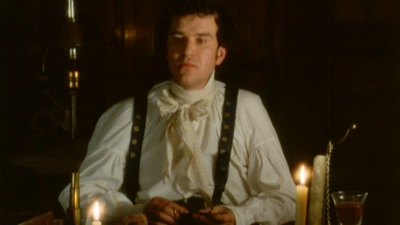
The DVD:
The Video:
The widescreen, 1.78:1 video image for Middlemarch is fairly good, with a reasonably sharp image, solid colors, and a bright image. I could be wrong, but I don't remember this being presented in a widescreen version when it played on PBS back in 1994. The compositions frequently look tight, with the tops of heads sometimes cropped -- it's possible this film was matted for this DVD release. Grain is apparent, as are occasional screen anomalies like dirt specks and scratches. I did see some very minor edge enhancement issues, but it wasn't distracting. On a side note, this is a flipper disc, which I've always disliked -- they scratch.
The Audio:
The English 2.0 stereo mix was quite good, with a strong, clear sound perfect for this kind of dialogue-driven film. Close-captioning was available.
The Extras:
Middlemarch: A Reader's Guide is a forty-minute featurette that gives a brief, but informative look at how to approach the book -- I suggest you watch it after viewing the film, because it does contain spoilers.
Final Thoughts:
A big budget, careful scripting to maintain Eliot's main concerns of social restrictions on romantic entanglements, tight direction despite the seven hour length, and excellent performances make the epic Middlemarch the best adaptation in this collection. I highly recommend Middlemarch.
DANIEL DERONDA
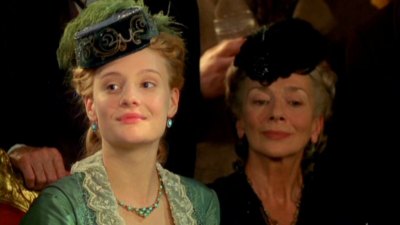
Starting with a flashback, where Gwendolen Harleth (Romola Garai) and Daniel Deronda (Hugh Dancy) meet over a gaming table at a German casino, we learn the backstories of our two lead protagonists. Gwendolen, a frivolous, openly ambitious beauty, has come to live with her relatively prosperous uncle in England. Looking to bag a rich man, she eventually sets her sights on Henleigh Grandcourt (Hugh Bonneville), a mysterious, slightly sinister character and one of the richest men in England. Sure of her power over him (which he admits to her), she nonetheless rejects his marriage proposal when she meets his mistress, Lydia Glasher (Greta Scacchi), who has illegitimate children by Grandcourt. But a turn in finances eventually convinces Gwendolen to marry Henleigh - with disasterous results.
Daniel, the illegitimate son of Sir Hugo Mallinger (Edward Fox), is a directionless youth who wishes to travel, learning other peoples cultures, before settling down to a career. Financed by Mallinger, Daniel travels and returns to England, where he encounters Mirah Lapidoth (Jodhi May), a mysterious woman who tries to commit suicide by drowning (Daniel was crewing when he spots her). Taking care of Mirah, he learns that she's Jewish, and becomes drawn into her culture. Growing closer to her emotionally, he must also decided what to do about his feelings for Gwendolen, who has recently become widowed when she fails to save Henleigh from drowning. Who will Daniel choose, and what will become of his life?
This was Eliot's last novel, and by this point in her life, she had become a much more marginal figure on the literary scene, as well as being seen as somewhat passe in popular culture. It has been said that Eliot's pro-Jewish novel met with resistence from English readers who were unsympathetic to such a positive portrayal. Seen today, Daniel Deronda is a fairly entertaining film, more for its directorial touches than for any great shakes in the acting or writing department. Tom Hooper, a successful TV director, infuses Daniel Deronda with quirky, visually arresting sequences that make up for some of the lesser performances in the film. Chief drawback on this score must come from Romola Garai as Gwendolen. Putting forth attitude rather than real complexity, Garai's performance is annoyingly superficial. Some might say that fits the character perfectly, but as any director or actor will tell you, a boring or annoying character is no excuse for a boring or annoying performance. Someone at some point must have told Garai that she has a very pretty mouth (which she does), because pursing her lips seems to be her fall back technique for showing petulance, happiness, sadness, or any other emotion she's asked to portray. She's just doesn't project an inner erotic quality that would make it believable that she could ensnare any man who looks at her (too bad it wasn't someone like Scarlett Johansson in the part). Danchy is good at projecting tortured indecision, but he's distant from the material, and fails to connect with our sympathies, as well. Bonneville, however, is quite good as the evil, perverse Grandcourt, and of course, Fox effortlessly commands whenever he's on the screen.
So it's really up to Hooper's direction to keep our interest here in Daniel Deronda. You can tell that Hooper sees the film in terms of set pieces, showing particular interest in the visual opportunities of scenes like the archery contest, the rowing sequence, and the drowning of Grandcourt. There's a big screen look to Daniel Deronda that's most impressive (there must have been a substantial budget for the film). The screenplay takes its time getting through the story, with a laid-back approach that at times makes the three-and-a-half film seem much longer. Still, if you're not familiar with this story (I wasn't), Daniel Deronda is a reasonably compelling Victorian romance with the interesting subplot of Daniel discovering England's "hidden" Jewish community.
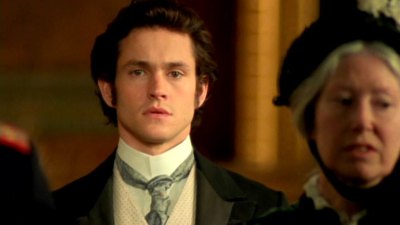
The DVD:
The Video:
Daniel Deronda is certainly the best looking transfer here in The George Eliot Collection. Shot in shimmering, gorgeous colors, the widescreen, 1.78:1 enhanced for 16x9 TVs video image is flawless. Skin tones are true, and blacks hold.
The Audio:
The English 2.0 stereo mix is quite good, with the beautiful score (featuring operatic arias) coming through nicely.
The Extras:
There's a behind-the-scenes photo gallery, as well as biographies for the cast and crew of Daniel Deronda.
Final Thoughts:
While one of the central performances leaves a lot to be desired, the director keeps Daniel Deronda visually interesting in this beautifully shot film. I recommend Daniel Deronda.
Final Thoughts on the Box Set:
Although the quality of the original source materials varies widely (the older titles look particularly rough from their video masters), the five films included in The George Eliot Collection provides for fans of the genre a big welcome dose of British TV adaptations of historical romances. Devotees of George Eliot and of British TV will want to buy this outright, while curious viewers should rent individual titles first to see if they want the whole box set. I highly recommend The George Eliot Collection.
Paul Mavis is an internationally published film and television historian, a member of the Online Film Critics Society, and the author of The Espionage Filmography.


|
| Popular Reviews |
| Sponsored Links |
|
|
| Sponsored Links |
|
|
| Release List | Reviews | Shop | Newsletter | Forum | DVD Giveaways | Blu-Ray | Advertise |
|
Copyright 2024 DVDTalk.com All Rights Reserved. Legal Info, Privacy Policy, Terms of Use,
Manage Preferences,
Your Privacy Choices | |||||||














